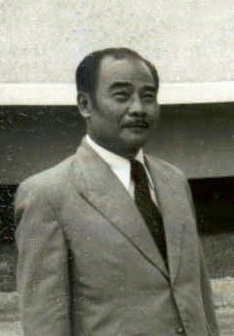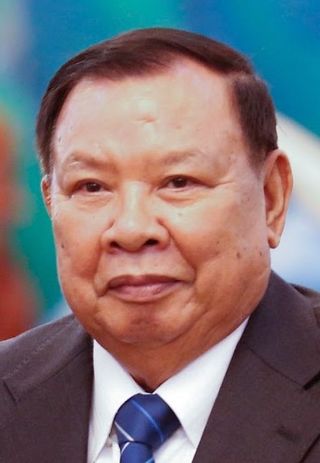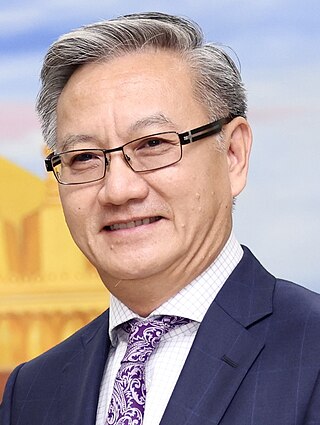Related Research Articles

Laos, officially the Lao People's Democratic Republic (LPDR), is the only landlocked country in Southeast Asia. It is bordered by Myanmar and China to the northwest, Vietnam to the east, Cambodia to the southeast, and Thailand to the west and southwest. Its capital and most populous city is Vientiane.

Evidence of modern human presence in the northern and central highlands of Indochina, which constitute the territories of the modern Laotian nation-state, dates back to the Lower Paleolithic. These earliest human migrants are Australo-Melanesians—associated with the Hoabinhian culture—and have populated the highlands and the interior, less accessible regions of Laos and all of Southeast Asia to this day. The subsequent Austroasiatic and Austronesian marine migration waves affected landlocked Laos only marginally, and direct Chinese and Indian cultural contact had a greater impact on the country.

The politics of the Lao People's Democratic Republic takes place in the framework of a one-party parliamentary socialist republic. The only legal political party is the Lao People's Revolutionary Party (LPRP). The head of state is President Thongloun Sisoulith, who is also the LPRP general secretary, making him the supreme leader of Laos. The head of government is Prime Minister Sonexay Siphandone.

Prince Souphanouvong, nicknamed the Red Prince, was along with his half-brother Prince Souvanna Phouma and Prince Boun Oum of Champasak, one of the "Three Princes" who represented respectively the communist (pro-Vietnam), neutralist and royalist political factions in Laos. He was the President of Laos from December 1975 to October 1986.

The Lao People's Revolutionary Party (LPRP) is the founding and sole ruling party of the Lao People's Democratic Republic. The party's monopoly on state power is guaranteed by Article 3 of the Constitution of Laos, and it maintains a unitary state with centralised control over the economy and military.

Luang Phabang, or Louangphabang, commonly transliterated into Western languages from the pre-1975 Lao spelling ຫຼວງພຣະບາງ as Luang Prabang, literally meaning "Royal Buddha Image", is a city in north central Laos, consisting of 58 adjacent villages, of which 33 comprise the UNESCO Town of Luang Prabang World Heritage Site. It was listed in 1995 for unique and "remarkably" well preserved architectural, religious and cultural heritage, a blend of the rural and urban developments over several centuries, including the French colonial influences during the 19th and 20th centuries.

Phoumi Vongvichit was a leading figure of the Pathet Lao and an elder statesman of the Lao People's Democratic Republic.

The Laotian Civil War was waged between the Communist Pathet Lao and the Royal Lao Government from 23 May 1959 to 2 December 1975. The Kingdom of Laos was a covert theater during the Vietnam War with both sides receiving heavy external support in a proxy war between the global Cold War superpowers. The fighting also involved the North Vietnamese, South Vietnamese, American and Thai armies, both directly and through irregular proxies. The war is known as the Secret War among the American CIA Special Activities Center, and Hmong and Mien veterans of the conflict.

Bounnhang Vorachit is a Laotian politician. He was previously General Secretary of the Lao People's Revolutionary Party and President of Laos from 2016 to 2021.

The Prime Minister of the Lao People's Democratic Republic, formerly the chairman of the Council of Government of the Lao People's Democratic Republic, is the head of government of Laos. The highest position in the government, they direct the country's executive branch. The prime minister is accountable to the president, the National Assembly and the country's only legal party: the Lao People's Revolutionary Party (LPRP). The current prime minister is Sonexay Siphandone, who was elected in 2022.

The French protectorate of Laos was a French protectorate in Southeast Asia of what is today Laos between 1893 and 1953—with a brief interregnum as a Japanese puppet state in 1945—which constituted part of French Indochina. It was established over the Siamese vassal, the Kingdom of Luang Phrabang, following the Franco-Siamese crisis of 1893. It was integrated into French Indochina and in the following years further Siamese vassals, the Principality of Phuan and Kingdom of Champasak, were annexed into it in 1899 and 1904, respectively.

Christianity is a minority religion in Laos.
Onechanh Thammavong is a Laotian politician and member of the Lao People's Revolutionary Party (LPRP). She served as the Minister of Labour and Social Welfare in the 6th Government of Laos.

Pany Yathotou is a Laotian politician and member of the Lao People's Revolutionary Party.
Kham Ouane Boupha is a Laotian soldier and politician. Appointed to command Phongsali Province in the Kingdom of Laos in 1957 or 1958 while he was in his mid-twenties, he would maintain that base throughout the impending Laotian Civil War. During that war, in April 1963, he would defect from government service to head the pro-communist Patriotic Neutralists movement. At the end of the war, as the Communists succeeded in gaining power through the Provisional Government of the National Union, Kham Ouane Boupha was appointed Deputy Minister of Defense on April 9, 1974. He was promoted to become Minister of Defense on May 12, 1975 and served as such for many years, even while he was also Minister of Justice. He retired from cabinet rank in 2006, becoming a minister in the Office of the Prime Minister.
Chansy Phosikham is a Laotian politician and member of the Lao People's Revolutionary Party (LPRP). He was born in 1948 in Luang Prabang Province, and served as a Deputy Governor and Governor of Luang Prabang Province. He was later appointed Governor of the National Bank in 2002, then appointed Minister of Finance in January 2003 and later serving As Governor Viang Chan Municipality.

Phoun Sipaseuth was a Laotian politician and member of the Lao People's Revolutionary Party (LPRP). He served as Deputy Chairman of the Council of Ministers and Ministers of Foreign Affairs during the 1980s.

The Lao Women's Union is a women's rights organization established in Laos on 20 July 1955. It was originally called the Lao Patriotic Women's Association, was renamed the Lao Women's Association in 1965 and got its present name at the 1st National Congress in 1984. It has acted as the official leader of the women's movement in Laos since its founding. It is responsible for promoting government policies on women, and protecting women's rights within the government, while liberating them from traditional norms within society and involving them in social revolution with the aim to promote their overall status and welfare in Laotian society.

Thongsavanh Phomvihane is a Laotian politician and member of the Lao People's Revolutionary Party (LPRP). He currently serves as Head of the LPRP Central Committee External Relations Committee, and is a member of the 11th Central Committee.
References
- 1 2 3 4 Stuart-Fox, Martin (2008). Historical Dictionary of Laos. Scarecrow Press. p. 155. ISBN 978-0-8108-6411-5.
- ↑ Blackburn, Susan; Ting, Helen (2013). Women in Southeast Asian Nationalist Movements. NUS Press. p. 223. ISBN 978-9971-69-674-0.
- ↑ Zasloff, Joseph J.; Unger, Leonard (1991). Laos: Beyond the Revolution. Palgrave Macmillan UK. pp. 175, 342. ISBN 978-1-349-11214-2.
- ↑ Dommen, Arthur J. (2002). The Indochinese Experience of the French and the Americans: Nationalism and Communism in Cambodia, Laos, and Vietnam. Indiana University Press. p. 498. ISBN 0-253-10925-6.
- ↑ "Former Party Central Committee Member and Deputy Minister of Foreign Affairs, Mr Khamphay Boupha, is Dead at 92". Vientiane Times. 5 January 2009.
- ↑ Souvannamethy Kou, Mahaku. Khampheng Boupha (1923–2011). p. 1. Retrieved 5 March 2022.